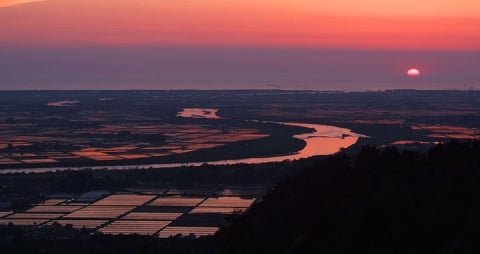Note: Yale School of the Environment (YSE) was formerly known as the Yale School of Forestry & Environmental Studies (F&ES). News articles and events posted prior to July 1, 2020 refer to the School's name at that time.

A group of scientists with origins at the Yale School of Forestry & Environmental Studies has reported the first global estimate of how much “ancient” carbon is released from the terrestrial landscape through aquatic systems.
While it is well known that conversion of forests into agricultural fields and urban areas has diminished carbon storage worldwide, a team of researchers, including F&ES Prof. Peter Raymond, shows that these land-use changes also release long-trapped carbon into rivers and streams.
Writing in the journal Nature Geoscience, they conclude that as much as 8.9 percent of dissolved organic carbon found in rivers is “aged carbon” that human disturbances have released back into the modern carbon cycle — analogous to the burning of fossil fuels.
The lead author of the study is David Butman ’09 M.Phil. ’11 Ph.D., a professor at the University of Washington, who began the research while he was a Ph.D. student at F&ES. The other authors include Rebecca Barnes ’08 Ph.D. and Henry Wilson, a former postdoctoral researcher at the Yale Institute for Biospheric Studies.
While it is well known that conversion of forests into agricultural fields and urban areas has diminished carbon storage worldwide, a team of researchers, including F&ES Prof. Peter Raymond, shows that these land-use changes also release long-trapped carbon into rivers and streams.
Writing in the journal Nature Geoscience, they conclude that as much as 8.9 percent of dissolved organic carbon found in rivers is “aged carbon” that human disturbances have released back into the modern carbon cycle — analogous to the burning of fossil fuels.
The lead author of the study is David Butman ’09 M.Phil. ’11 Ph.D., a professor at the University of Washington, who began the research while he was a Ph.D. student at F&ES. The other authors include Rebecca Barnes ’08 Ph.D. and Henry Wilson, a former postdoctoral researcher at the Yale Institute for Biospheric Studies.
This was a great effort from a group of Yale F&ES scientists which started as talk over coffee and ended with an important finding.
“This was a great effort from a group of Yale F&ES scientists which started as talk over coffee and ended with an important finding,” said Raymond, a professor of ecosystem ecology.
The study is an offshoot of an analysis of 13 major river basins in the U.S. conducted by Butman while he was at F&ES. Using trends observed during that research, he and the other authors, while at Yale together, expanded the scope to include field sites from the Arctic to tropical ecosystems.
While the impact of this increase on the carbon cycle is not clear, it certainly suggests that humans are reducing how much carbon is stored in the land through changes in the land, Butman says.
Henry Wilson is now at the Agriculture and Agri-Food Canada’s Brandon Research Centre; Rebecca Barnes is an assistant professor at Colorado College; and Marguerite Xenopoulos the final author is an associate professor at Trent University.
The original paper:
The study is an offshoot of an analysis of 13 major river basins in the U.S. conducted by Butman while he was at F&ES. Using trends observed during that research, he and the other authors, while at Yale together, expanded the scope to include field sites from the Arctic to tropical ecosystems.
While the impact of this increase on the carbon cycle is not clear, it certainly suggests that humans are reducing how much carbon is stored in the land through changes in the land, Butman says.
Henry Wilson is now at the Agriculture and Agri-Food Canada’s Brandon Research Centre; Rebecca Barnes is an assistant professor at Colorado College; and Marguerite Xenopoulos the final author is an associate professor at Trent University.
The original paper:
Butman, David E.; Wilson, Henry, F.; Barnes, Rebecca T.; Xenopoulos, Marguerite A.; and Raymond, Peter A. 2014. Increased mobilization of aged carbon to rivers by human disturbance. Nature Geoscience. doi:10.1038/ngeo2322
– Kevin Dennehy kevin.dennehy@yale.edu 203 436-4842
Published
January 8, 2015